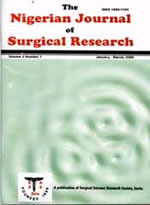
|
Nigerian Journal of Surgical Research
Surgical Sciences Research Society, Zaria and Association of Surgeons of Nigeria
ISSN: 1595-1103
Vol. 8, No. 3-4, 2006, pp. 151-154
|
 Bioline Code: sr06036
Bioline Code: sr06036
Full paper language: English
Document type: Research Article
Document available free of charge
|
|
|
Nigerian Journal of Surgical Research, Vol. 8, No. 3-4, 2006, pp. 151-154
| en |
Wound dressing where there is limitation of choice
Rahman, G. A.; Adigun, I. A.; Yusuf, I. F. & Ofoegbu, C. K. P.
Abstract
Background
Many sophisticated dressings are available to the wound care practitioner in the developed countries. These materials are made from a wide range of products like polyurethane, salts of alginic acid and other gelable polysaccharides. The situation is different in the developing countries where what is commonly available to wound care provider are traditional agents such as sodium hypochlorite, hydrogen-peroxide, cetrimide solution, chlorhexidine and others. The aim of this study is to reappraise the problem of limitation of wound dressing selection in the developing countries and to sensitize the wound care practitioner on the use of the commonly available products based on the needs of a different wound or even the same wound throughout its healing course.
Patients and methods
Patients attending the General Outpatient Department (GOPD) of our hospital for wound dressing were used for the study. Five surgeons who are familiar with wound care management visited the dressing unit of the GOPD daily for one week in October 2005. A proforma was designed where information on each of the patient was recorded.
Results
Fifty-three patients attended the dressing unit of our GOPD during the study period. Twenty-six patients (49.1%) had their wounds dressed with hypochlorite solution (Eusol), seventeen patients (32.1%) had their wounds dressed with honey and two patients, wound were being dressed with hydrogen peroxide.
Conclusion
While we are still awaiting the availability of the newer products in the developing countries, we should make use of the traditional products that are readily available to us according to the need of a particular wound, by this, our choice of wound dressing will not be arbitrary, ineffective and wasteful both in terms of time and physical resources.
Keywords
wound, dressing, types, developing countries.
|
| |
© Copyright 2006 - Nigerian Journal of Surgical Research
|
|
